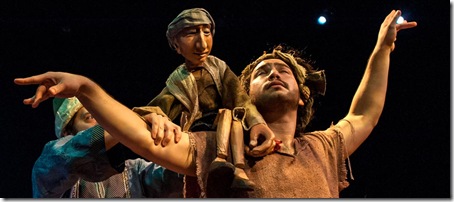The Arabian Nights comes to Cambridge: Spinning Ancient Tales for a Modern Audience.
Photo: A.R. Sinclair
The Central Square Theatre in Cambridge, Massachusetts is currently presenting Arabian Nights as their holiday show, making the festive season more welcoming to all. This universal classic compilation, which has its roots in tales that originated across centuries in Persia, India, and Arabia, among others, is fittingly played by a multi-racial cast. Out of the hundreds, if not a thousand and one stories, adapter Dominic Cooke selected five, two of which, “Ali Baba and the Forty Thieves” and “Sinbad the Sailor” are well known. Familiar character names are somewhat exoticized; Schahrazad instead of Scheherazade, for instance.
Advertised as a family show, it contains sexism, abuse of power, and violence that in 2014 have a disconcerting pertinence to current politics, given recent news accounts of beheadings in Muslim countries. The framing story tells of the King’s vengeance against all women because of his dead wife’s infidelity. Each night, he rapes a virgin and has her beheaded the following morning. In this version, however, Schahrazad volunteers as a victim in the belief – validated in the end – that she will be able to change his thinking through the power of storytelling. She is willing to risk death to be able to save the lives of young women. Her ploy is to entertain the King with tales so that he will spare her to hear another.
In the story of Ali Baba, his brother is killed and cut into four pieces by bandits, then later sewn together by a tailor so that he can be buried. In a gruesome act, Ali Baba’s maid avenges the brother’s death and saves her boss. She realizes that the outlaws, planning to murder Ali Baba, are hiding in urns, and pours boiling oil into each container. Since the containers are made of the black cloaks the men are wearing, the horror turns into something of a visual joke. Disguising the actors by covering them with cloaks becomes a running gag.
Children watching the play appeared more rapt than alarmed, likely because it is a vibrant show, well-designed for the three-quarter round stage, with imaginative costumes, stunning lighting, lyrical and spirited dance, original music and clever puppetry. Vivid color is the hallmark of the setting and costumes. Scene designer David Fichter and costume designer Leslie Held make daring use of reds, purples, blues, greens, golds, and orange. The painted floor, with its circular designs suggests, but does not imitate, the look of a Persian rug. Five ceiling to floor diaphanous draperies decorate the back wall. A white screen between drapes is used for rare projections. Kareem Roustom’s mainly middle-eastern music sets the moods and propels the stories.
Stories are spoken, danced, occasionally sung, sometimes mimed, and towards the end of the performance, enacted in sign language. The talented ensemble of nine actors, all of whom play multiple roles in this more than sixty character production, is composed of skilled movers. Daniel Gidron’s direction is intelligent, effective, and comic when appropriate. However, sharp as the production is, it would work better if it were shortened.
Arabian Nights plays through December 31, 2014 at the Central Square Theatre in Cambridge, MA.
Presented by the Nora Theatre Company and Underground Railway Theater
Adapted for the stage by Dominic Cooke
Directed by David Gidron
Scenic & Puppetry Design David Fitcher
Assistant Designer, Puppet Master Will Cabell
Costume Design Leslie Held
Lighting Design Karen Perlow
Properties Artisan Talia Lefton
Composer and Sound Design Kareem Roustom
Choreographer and Movement Judith Chaffee
Ensemble
Paige Clark, Brandon Green, Obehi Janice, Albert Joseph, Sophori Ngin, Vincent Ernest Siders, Andrew Tung, Christopher James Webb, Debra Wise
